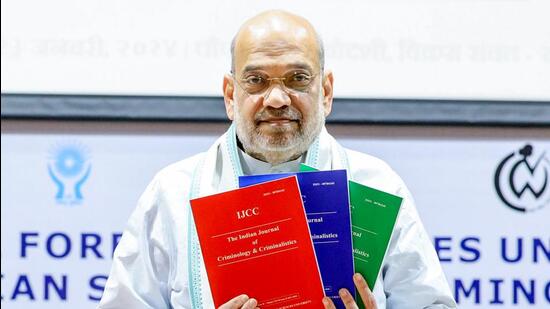Union home minister Amit Shah said that India has abolished the 150-year-old laws of criminal justice and introduced three new laws to revamp the country’s criminal justice system
Union home minister Amit Shah on Tuesday said that after the introduction of three new criminal laws, India’s criminal justice system will be the most modern system in the world within the next five years.

Speaking at the fifth International and 44th All India Criminology Conference of the National Forensic Sciences University (NFSU) in Gujarat’s Gandhinagar, Shah said that it marked a crucial juncture as India’s criminal justice system is entering into a new era.
He said that India has abolished the 150-year-old laws of criminal justice and introduced new laws. Parliament has approved three new laws, namely Bharatiya Nyaya (Second) Sanhita, Bharatiya Sakshya (Second) Bill, and Bharatiya Nagarik Suraksha (Second) Sanhita, to revamp our criminal justice system, he said, adding that the focus of these three lawsis on ensuring timely justice and boosting the conviction rate to curb crimes.
Shah highlighted a “bold directive” mandating Forensic Science Officers’ presence at crime scenes involving offenses with a punishment of seven years or more.
“This decision aims to simplify investigations, facilitate judicial processes and make prosecution simple,” said Shah, outlining a holistic approach to modernising the entire criminal justice system within the specified timeframe.
“This will also help us in increasing the conviction rate. Along with this, efforts are also being made to modernise the entire process. After five years, India’s criminal justice system will be the most modern system in the world,” he said.
Shah said that Prime Minister Narendra Modi has done more than 50 path breaking work in every field in the last 10 years, and three significant work in this field alone, in the last five years.
“First, after 40 years, the Modi government came up with a new National Education Policy which is completely based on Indian education, open to the whole world and will also provide a global platform to our children. Second, the foundation of NFSU which was laid down in Gujarat in 2003, expanded to establish the National Forensic Science University. Third, by making changes in the criminal justice system after 150 years, we have made three new laws,” Shah said adding that if these three changes are seen together, there can be a comprehensive change in education, forensic science and the criminal justice system.
He said that under the leadership of Prime Minister Modi, necessary arrangements have been made to ensure that 5 years later the country will get more than nine thousand scientific officers and forensic science experts every year.
The conference is centered around Forensic Behavioral Science, an emerging field. Amit Shah expressed that “Behavioral Science can play an equal role in preventing crimes as does a strict administration and a good judiciary.” He added that understanding behavior, if integrated into primary education, can be instrumental in preventing criminal tendencies, surpassing the approach of the Modus Operandi Bureau.
He said that forensic science should be used in investigation, prosecution, justice system and now the time has come to go one step further by adopting it in education. “This is an important event in the direction of preventive, predictive and protective policing. An in-depth study of the criminal mind and behaviour and its strategic use in preventing crimes from happening in the coming days and averting the rise of criminals, it will be a great service to the entire world,” said Shah.
A Digital Forensic Excellence Centre was also inaugurated in Gandhinagar on Tuesday to help in capacity building and investigation.
He highlighted four challenges facing our criminal justice system at this juncture – to evolve into the most modern police system by wholeheartedly embracing technology without compromising basic policing principles, to prevent technology from diminishing the significance of human presence, to identify and address hybrid and multi-dimensional threats by fortifying the entire network, and to establish our criminal justice system as the most modern globally by boldly incorporating forensics as a distinctive feature.
With the constant evolution of the form, mode, and method of crime, he stressed the necessity for law enforcement to stay two generations ahead of both crime and criminals.
“To prevent crimes, we should also try to bring global uniformity in the policies and rules of technology,” he added.
Unlock a world of Benefits with HT! From insightful newsletters to real-time news alerts and a personalized news feed – it’s all here, just a click away!- Login Now! Get India NewsRam Mandir Ayodhya Ram Mandir Live along with Latest News and Top Headlines from India and around the world
This post was originally published on this site be sure to check out more of their content.








